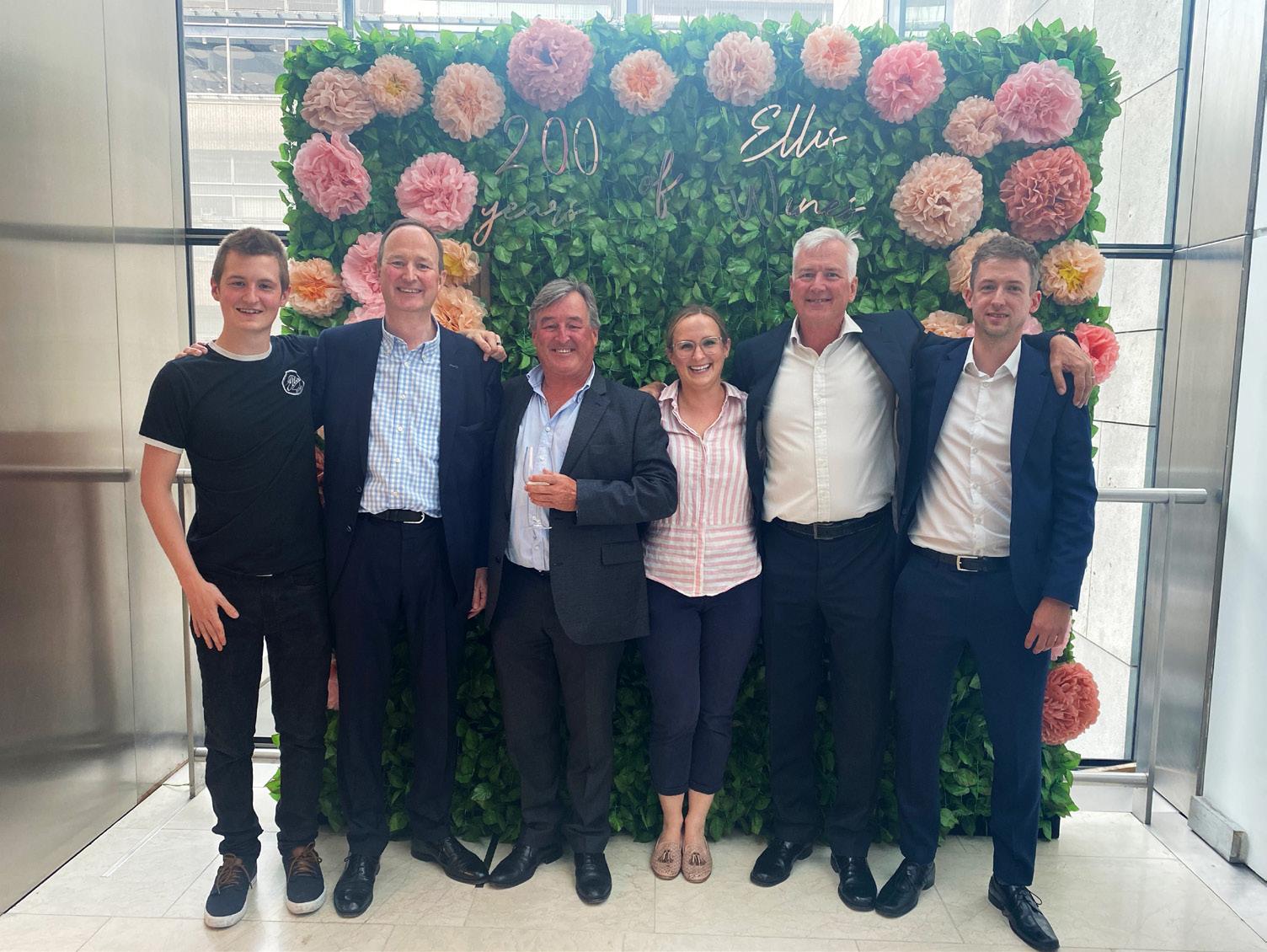




2 0 2 2


The History of Ellis Wines







2 0 2 2



Joseph II
b: 1814 d: 1890
Henry William
b: 1867 d: 1945
Henry Derek
b: 1901 d: 1965
Henry Colin
b: 1931 d: 2019
William
b: 1816 d: 1870
Joseph
b: 1783 d: 1858
Charles
b: 1817 d: 1908
Henry
b: 1840 d: 1901
Thomas Barclay
b: 1869 d: 1944
Vera (m. Pat Cunningham)
b: 1906 d: 1997
Thomas Shaun Maxwell
b: 1938 d: 2012
Guy Maxwell
b: 1969 d: 2022
Henry James
b: 1960
Holly Rose
b: 1990
Edward b: 1820
Nicholas Barclay
b: 1972 d: 2004
Angus James
b: 1999
John Robert Henry
b: 1963
Stefan Henry
b: 1990
William Derek
b: 1965
John Whittaker
b: 1829 d: 1912
Frank Stokes
b: 1875 d: 1962
Frederick b: 1830 d: 1901
Henry b: 1832 d: 1910
George b: 1834
Arthur Montague
b: 1880 d: 1951
b: 1967

Joseph Ellis was proprietor of the Star & Garter Hotel at the top of Richmond Hill. He purchased the lease in 1822 and set out to develop the hotel to cater not just for the aristocratic society but, for people to enjoy privacy in congenial surroundings within a short distance of London. The hotel’s popularity in the mid 1800s brought many English writers to the hotel, including Thackeray, Tennyson and Dickens.
Whilst proprietor of the Star & Garter, Joseph Ellis also established the wine business, trading as Joseph Ellis & Sons. In c.1840, his 3rd son, Charles, became a partner with him in the business.
In 1847 he transferred the business to Charles, as shown from a draft letter headed Richmond Hill, May 1847, which states:
“I beg to acquaint you that I have relinquished the Wine Business carried on for the last Ten Years at the premises Hill Street Richmond, in favour of my son CHARLES, who has been principally engaged in conducting it almost from the time of its establishment.”
Joseph Ellis ran the Star & Garter until his death in 1858, when it was passed to his 8th son, George Ellis. He ran the hotel until 1864 when the hotel was then sold and he took more interest in the wine business.
Charles Ellis took the reins of the wine business from 1847 and continued to run it from Hill Street in Richmond where, he was recorded as paying rates in the 1860 and 1870 census.
Charles no doubt used the family connection of the Star & Garter hotel to help sell wine, most notably to Charles Dickens and other writers of the time.
This is most notable from WM Thackeray’s novel Pendennis, published in 1848. Chapter 19 states that: “The wine at the Polyanthus (Club) was not so good as Ellis’s wine at Richmond”.
He also set up as a wine merchant at 21 College Hill, Cannon Street West in the City of London. In 1880 he retired, with the business passing to his brother George. This is evidenced by George who is recorded as paying rates at the Richmond premises in the 1880 census.
Draft letter, May 1847

On 25th September George Ellis sold the Richmond business to Henry Ellis (Charles’ son) and Henry’s eldest son, Henry William.

Once George Ellis sold the Star & Garter, his involvement in the business began and was well established by 1872. The business also started to trade as Ellis & Co. under his tenure.
On 14th June 1882, Ellis & Co. opened its bank account with Glyn Mills of Lombard Street.
By 1886, branches had been opened in Kingston upon Thames, Ealing, Teddington and Foxton Terrace on Richmond Hill.
On 25th September 1892, George Ellis sold the Richmond business to Henry Ellis (Charles’ son) and Henry’s eldest son, Henry William.
Henry Ellis had established in c.1875, a wholesale wine business at 36 & 37 Leadenhall Street in the City of London, where there were extensive cellars. He was a shrewd and a far-seeing businessman and had the assistance of three of his four sons – Henry William, Thomas Barclay and Arthur Montague.
The price list of 1896 saw the inclusion of the Wholesale & Export offices at 36 & 37 Leadenhall Street, London EC, and by 1901 the company had expanded to 10 branches.
On his death in 1901, the business was transferred to Henry William and Thomas Barclay, with Arthur Montague joining in 1902.
Ellis & Co. price list cover – 1896


Henry William Ellis spent many years gaining knowledge of the business and delved deeply into the origin of grapes and, as a result, was considered to be one of the best wine valuers in London.
The company undertook many valuations, for which they had a specialist department. One valuation of note being that of The Old Cheshire Cheese in Fleet Street.
He was a member of the Merchant Taylors Company and was able to obtain the Royal Warrant for the company.

Thomas Barclay Ellis put most of his energy into the sales side of the company, doing business with many hotels in London, Bristol, Cheltenham, Southampton and Bournemouth. In addition, the company ran their own licensed properties in London, Bournemouth and Boscombe, as well as Southampton.

Arthur Montague Ellis was a fine administrator and ran the ever expanding branch network.
Henry Derek Ellis (son of Henry William) joined the company in 1919, and became involved with the buying and administration.
After the deaths of Thomas Barclay in 1944 and Henry William in 1945, it was decided to float the company on the London Stock Exchange on 12 th March 1947. He was Chairman and Managing Director until his death in 1965.

 Henry Colin Ellis (1931–2019)
Henry Colin Ellis (1931–2019)
Henry Colin Ellis (son of Henry Derek), joined the business in 1949 and initially worked in the cellars bottling wines and spirits. He developed his knowledge, visiting vineyards in France in the 1950s and he succeeded his father in 1965.
He developed the concept of self service through Fairdeal Vintners, but the granting of the alcohol licence to the supermarkets saw the business struggle, with the eventual merger of the business with Gough Brothers in 1978.
Thomas Shaun Maxwell Cunningham (Thomas Barclay Ellis’s grandson) joined the business in the late 1950s and became responsible for the management of the branches until the Gough Brothers merger.
In June 1979, Colin Ellis and Shaun Cunningham left Gough Brothers to form a new wholesale wine business, Ellis of Richmond Ltd.
1979
In June 1979, Colin Ellis and Shaun Cunningham left Gough Brothers to form a new wholesale wine business, Ellis of Richmond Ltd.
Letter from His Highness Prince Metternich’s Castle
Johannisberg dated 1st October 1848

Copy letter dated 1st October 1848 from His Highness Prince Metternich’s Castle Johannisberg appointing Mr Leiden of Cologne as agent for the United Kingdom and then appointing Charles Ellis as his agent.
“In consequence of this agreement, and in order to give greater facility to the transactions of this business I here appoint this day as Agent for England Mr C Ellis of Richmond, and of 159 Fenchurch Street, London, by which arrangement orders transmitted to him will have the same attention as to me directly.
Cologne 1st of October 1848
D Leiden“
1876 Price List (oldest in the archives)

The price lists of the late 1880s, 1890s and 1900s predominately show the following wines being sold: Sherry – listing over 30 sherries, available in bottle, gallon or cask.
Claret – from Sound Ordinaire to Château Latour 1st growth Grand Vin.
Champagne – including Perrier-Jouët, Moët & Chandon, Louis Roederer and Veuve Clicquot-Ponsardin and G. H. Mumm & Cie.
Other wines listed included Red Burgundy, Marsala and Madeira, Ports, Hock and Moselle.
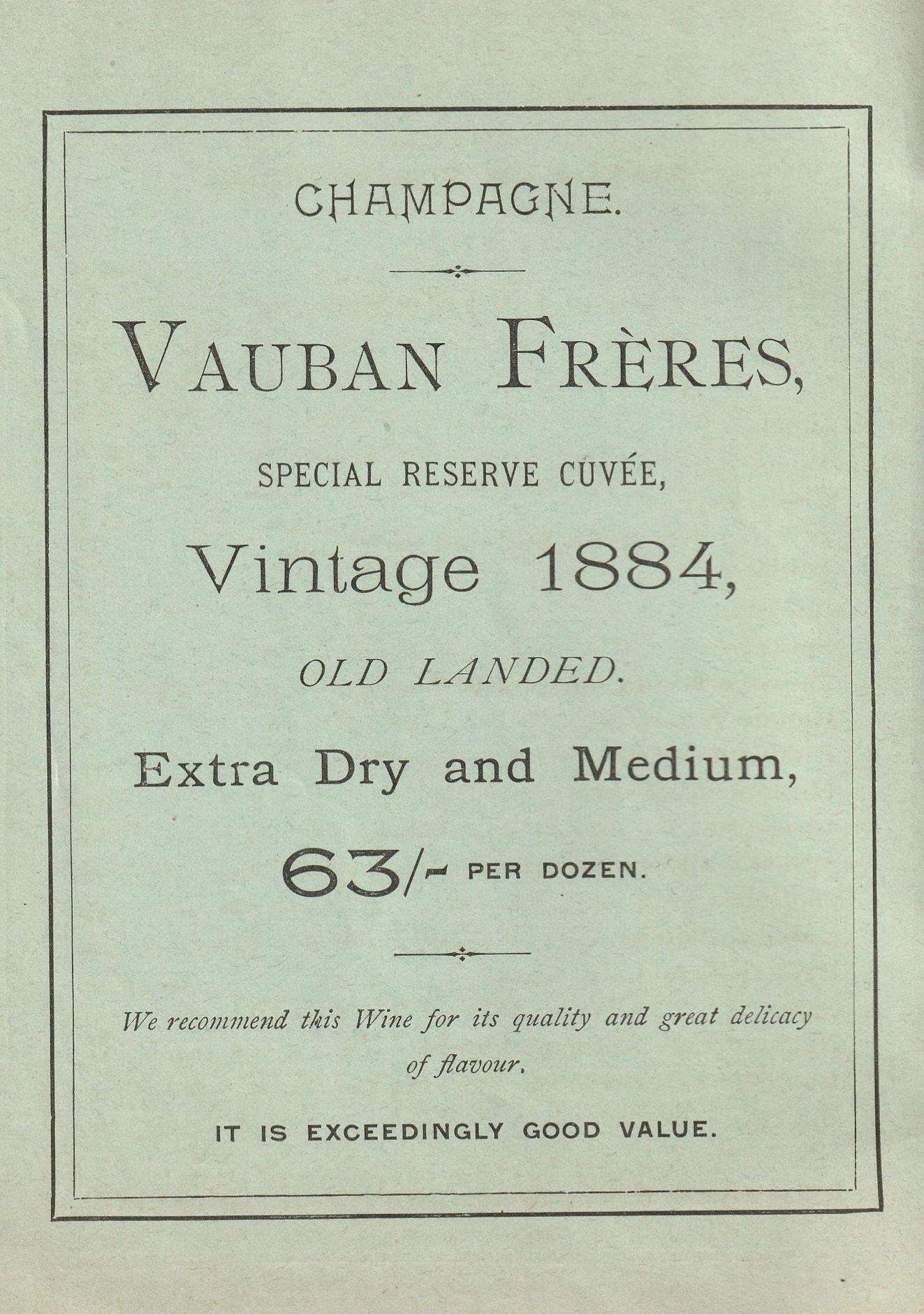

Of special note is the price list of 1893, which introduced Vauban Frères Champagne, which is still our House Champagne to this day.
By the outbreak of World War I in 1914, the range had increased to include wines from Australia, California and Rioja.
The 1920s saw a wider range of Champagnes, including Pol Roger, Charles Heidsieck and Bollinger. Red Burgundies were available from Santenay, Volnay, Nuits-St-Georges, Pommard and Chambertin-Gevrey and White Burgundies from Chablis, Pouilly, Meursault and Montrachet.
The early 1940s saw a reduced offering, with the 1940 list preface stating:
“We apologise for the fact that our price list is neither so elaborate nor comprehensive as usual, this is of course being due to the exigencies of the situation….”
The 1950s and 1960s saw the introduction of wines from the Rhône, Portugal and Italy. The business also stocked an extensive portfolio of spirits and liqueurs.
Up until the early 1900s, spirits were sold in bottles as well as in cask by the gallon but, by the 1920s, they were predominately listed by the bottle.
VAT 99 Rare Old Scotch whisky was our own blend, introduced in the late 1920s. This particular blend appealed to the American market (sold as Ellis 99 10 year old, as VAT 69 was a brand already registered in the USA) and the firm secured export orders after prohibition was abolished in 1933. The first consignment exported was loaded upon the Queen Mary on her maiden voyage in May 1936. Exports were also made to Australia and Japan.
In 1936 we received a royal ticking off for using the Royal Arms on the label of Vat 99 whisky, whereas we only had the warrant for use on wines.


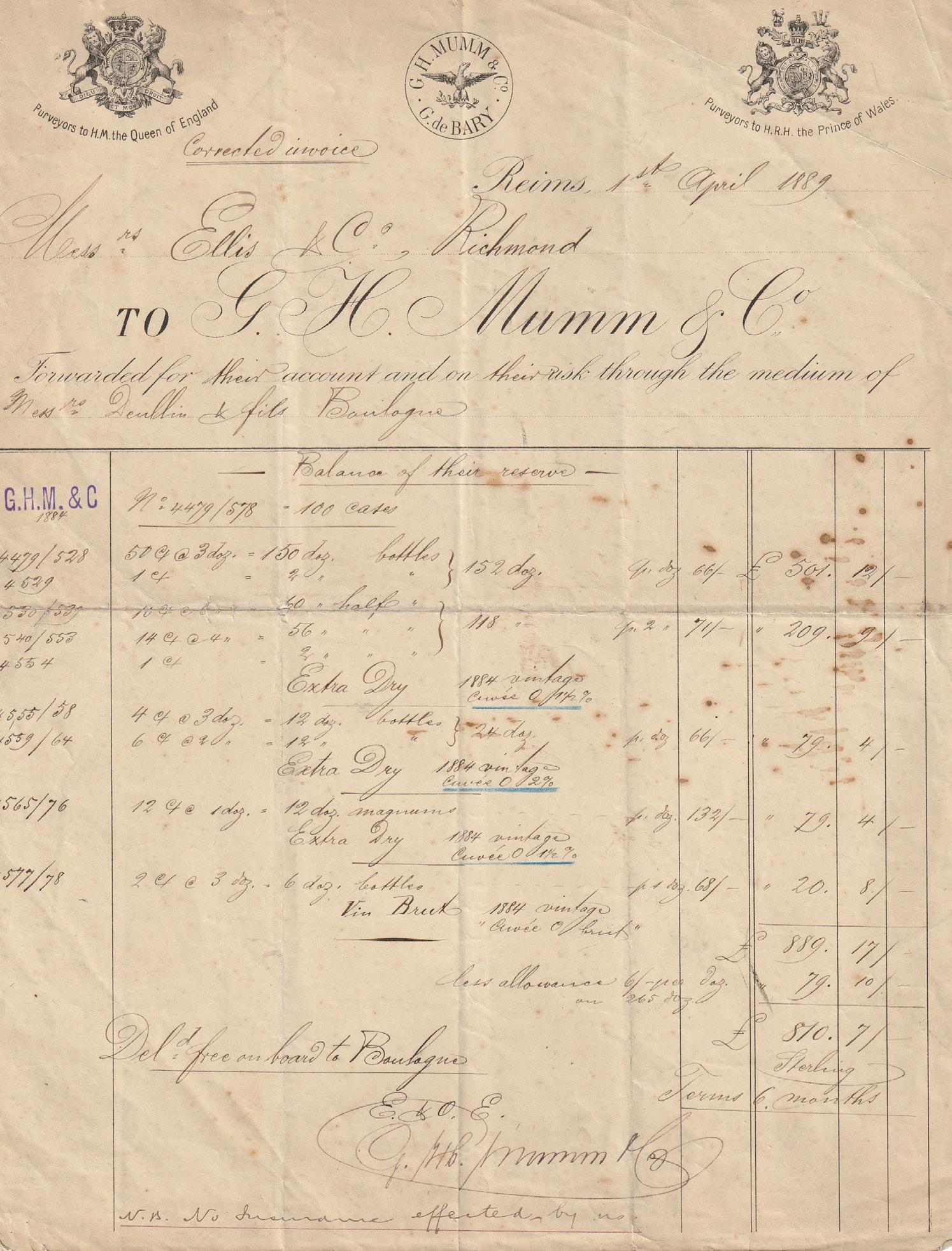
1887 Price List

The company also stocked and supplied a range of beers, from Guinness Extra Stout, Bass Ale as well as our own brands, Ellis’s Trent Ale, Cooper and Strengthening Stout, including Quaker Oatmeal Stout.
On 14th May 1872, Dr Hassall of the Analytical Sanitary Institute, 2 Adelphi Terrace, Strand reported on the Trent Ale of Mr George Ellis.
Trent Ale: “I find it to be a genuine and carefully brewed Pale Ale of delicate flavour and very superior quality”
Trent Stout: “I find it to be of good quality and excellent flavour, free from undue acidity, soft, creaming and nourishing”
Trent Cooper: “I find it to possess all the characters of a genuine Malt Beverage of good quality and in good condition”.
1887 Price List

In 1903, there was a disagreement over the use of the word 'Quaker' on our beer brands, brought against us by the Society of Friends, as they were against the consumption of alcohol. We were taken to court but won the case. A few years later, in 1905, Quaker was again disputed, this time by Quaker Oats. We conceded that we wouldn’t use it on our Oatmeal Stout but, it wasn’t until after WWII, that we eventually sold the rights to them.
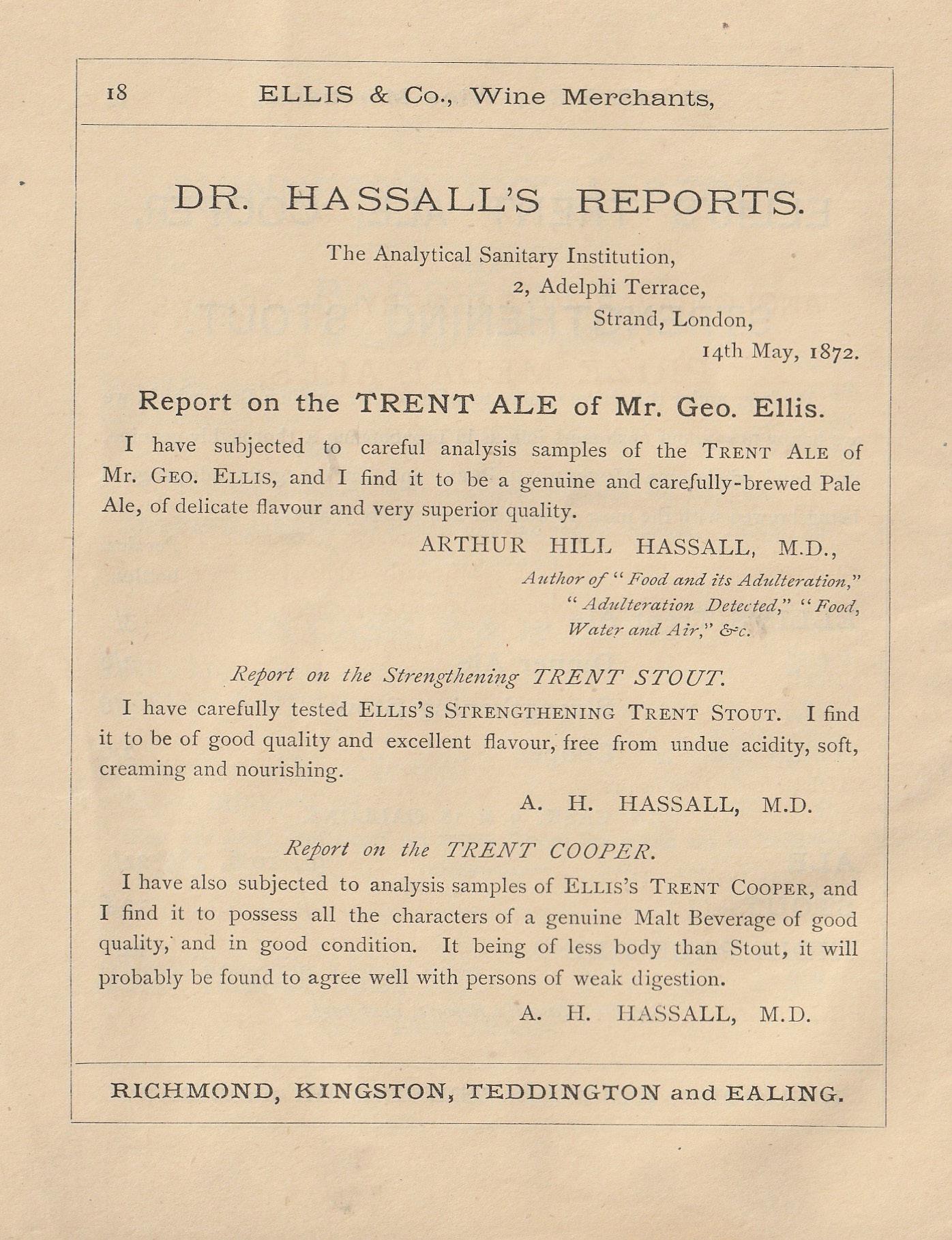
“I find it to be a genuine and carefully brewed Pale Ale of delicate flavour and very superior quality” Dr Hassall
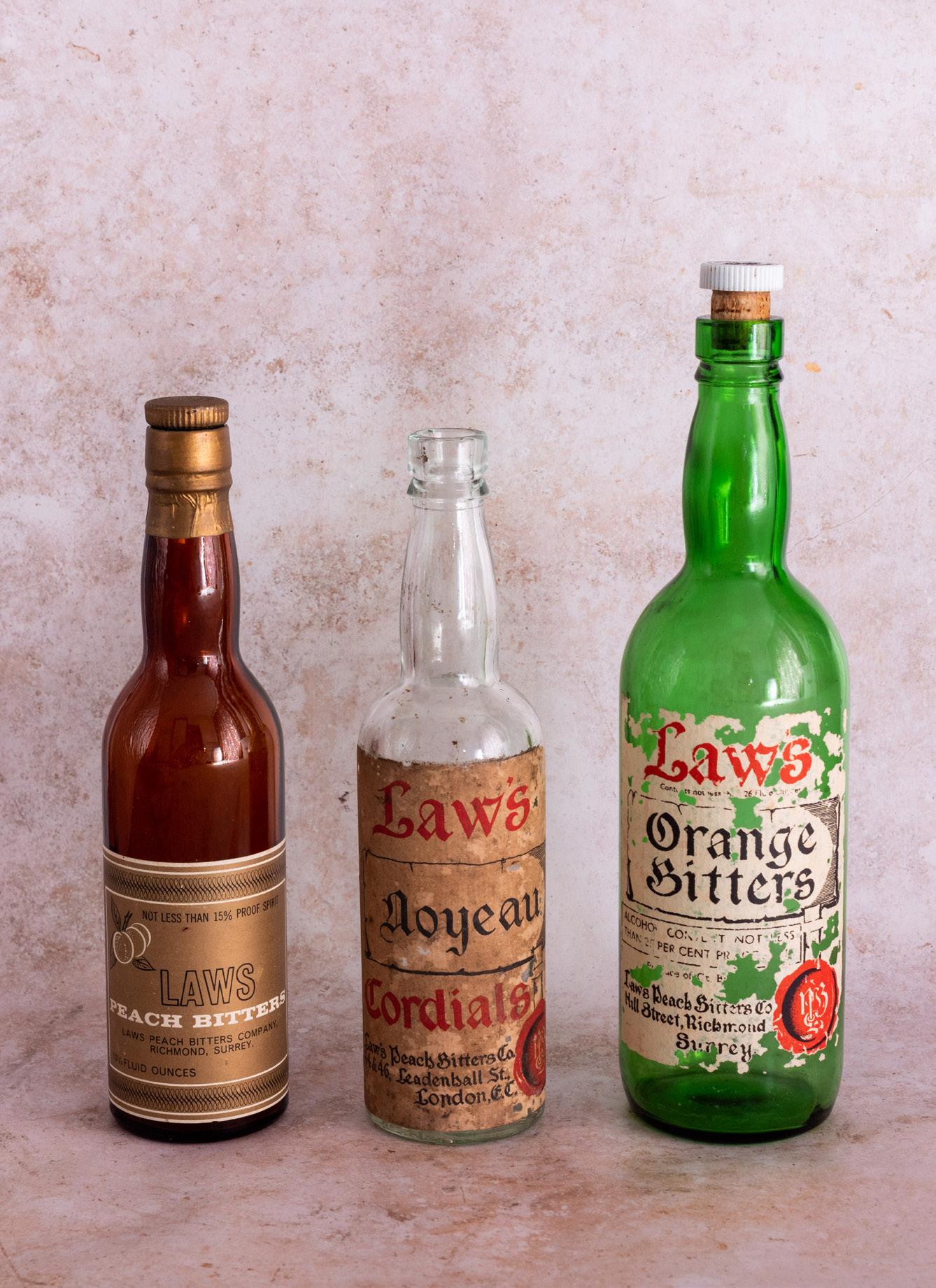



Letter to Mr George Pacey, 19th July 1842

One of the earliest record in the archives is a copy of a letter to Mr George Pacey, headed Hill Street, Richmond, 19 th July 1842.
Sir,
I had the pleasure to forward this morning according to your desire, 2 Hampers, 4 dozens wine …. Invoice enclosed. We have chosen such as we think cannot fail to please and trust the prices are about what you could wish them to be. I shall be willing to allow 5 percent discount for cash….
I am Sir
From most obediently Charles Ellis pro Joseph Ellis & Sons
Charles Dickens’ Cellar Book
It is well documented that Charles Dickens kept an extensive cellar. The night before he died in June 1870 he took an inventory of it at his home, Gadds Hill Place in Higham, Kent.
It can be seen clearly that he marked against wines from whom he bought it from.
Cask of Sherry - marked as Ellis
There is also another but undated record of the contents of his cellar:
5 doz Port – Ellis
1 doz very old Port – Ellis
4 doz champagne – Ellis
1 doz very old Sherry – Ellis
1 doz Metternich Hock - Ellis
Sales Ledger 1887 – 1893

A review of the only existing sales day book between July 1887 and July 1893, shows mainly private customers but, there are entries for inns and hotels:
The Spotted Cow, Bat & Ball Inn, Bird in Hand, Prince of Wales, Farnham Conservative Club, White Lion Yateley, Royal Oak Wrecclesham, Rose & Thistle, 3rd Battalion Oxford Light Infantry, Albion Hotel, The Alma Inn.
In 1899, the company was successful in obtaining the contract to supply New Palace Steamers Ltd, who operated three steamers (La Marguerite, The Koh-i-noor & Le Belgique) between London and Calais, Boulogne, Dunkirk & Ostend.
The company had the honour of supplying the Royal Household from 1839 to 1964.

Duke of Cambridge dated 8th July 1839 (This is the earliest document in the archives)
Cambridge House, Piccadilly.
This is to certify to all whom it may concern that His Royal Highness The Duke of Cambridge has been pleased to nominate & appoint Messrs Ellis & Son of the town of Richmond, to be Wine Merchants to His Royal Highness, with all the Rights & Privileges usually granted on similar occasions.
By Command of His Royal Highness
The Duke of Cambridge
Signed & sealed by an Equerry
Queen Victoria dated 4th February 1851
Copy of a document granting Charles Ellis a Royal Warrant to Her Majesty Queen Victoria.
These are to Will and require you forthwith to Swear and Admit the bearer hereof Mr Charles Ellis into the place of Purveyor of Wine to Her Majesty. He is to have and enjoy all the Rights, Profits, Privileges and Advantages to the said Peace belonging during my will and pleasure, and for so doing this shall be Your Warrant.
Given under my hand this Fourth day of February 1851 in the 14th Year of Her Majesty’s Reign.
(signed) Westminster


Years spent supplying Royal Warrants.
Appointment of Royal Warrant, 1903 (1)

Edward VII dated 29th May 1903
Letter from the Board of Green Cloth, Buckingham Palace SW appointing Messrs Ellis & Co.
The Royal Warrant was held for three successive reigns as follows:
His Majesty King Edward VII 1903 – 1910
His Majesty King George V 1910 – 1936
His Majesty Edward VIII 1936
Our application for the Royal Warrant to His Majesty George VI was rejected in 1941, however we continued to supply, with our last order being delivered in March 1964.
Appointment of Royal Warrant, 1903 (2)




Appointment of Royal Warrant, 1910






The earliest record of the business operating from Hill Street is the entry in ‘Pigot’s Directory’ of 1840 under wine merchants as ‘Ellis, Joseph & Son, Hill Street’.
The year 1840 also saw the planting by Joseph Ellis, of a vine on the corner of the premises on Hill Street, which is still in existence to this day.
The premises were quite extensive between Hill Street, Whittaker Avenue and Water Lane, with cellars running down towards The Thames.
An extract from The New Era Illustrated magazine of August 1930 stated:
‘The cellars are a series of vaulted chambers, straggling on and on, right up to the bank of the river Thames, and in them reposes thousands upon thousands of bottles of wine’.
The year 1840 also saw the planting by Joseph Ellis, of a vine on the corner of the premises on Hill Street, which is still in existence to this day.
There are some interesting insights into working life in Victorian times that can be seen through reviewing the Ellis & Co rule book.
5th May 1879
‘It is the duty of every Carman to consider whether he is likely to be absent from home after 1 o’clock and if so – to take a “Nose bag” and feed his horse as near to the usual hour as possible …..’
Rules & Regulations
11th September 1883
1. Hours from half-past eight till seven
2. Mealtimes. Dinner one o’clock, one hour
3. Pay day. Friday Saturday
4. Sunday – Expected to be observed
5. Journal – To be kept, daily, of all work done
6. Written order – is the only working order
7. Return written orders with journals to Counting House
14th May 1885
‘Silence should be kept during working hours and it is absolutely ordered and necessary, whilst sacking operations are being carried on, or blunders and incorrectness will be the result.'





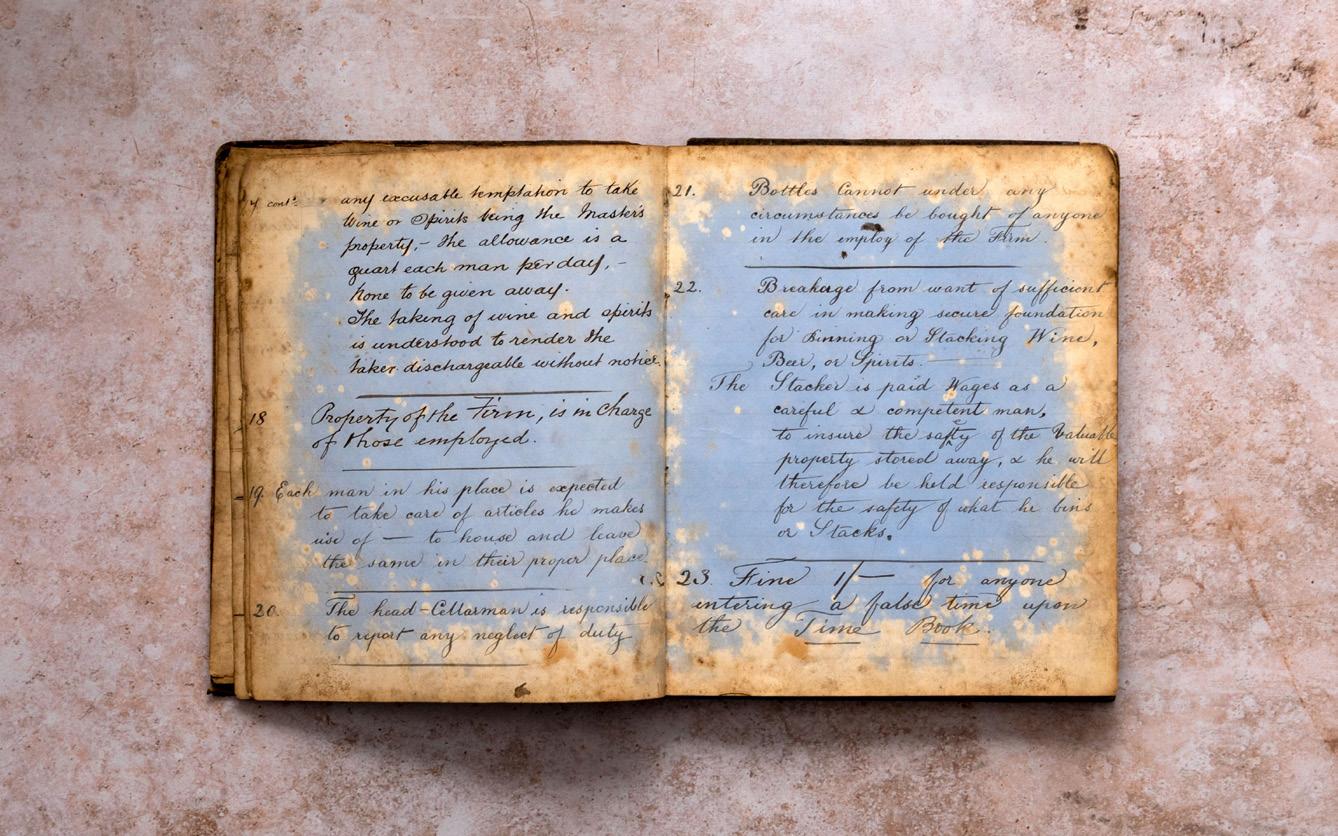




The cellars contained vats of spirits, wines and ports and they were bottled from a tap in the cask, corked and binned unlabelled. When an order was received, it was very laborious to go the bin, clean the bottles, cap and label and then dispatch in wooden boxes. This was all done by hand.
There was also bottling of beer, cider and the filling of soda syphons. These were all returnable so had to be washed for re-use.
In 1926, the head office at 36 & 37 Leadenhall Street, London EC was transferred to Hill Street. Operating in the City of London had become increasingly challenging, especially loading and parking the drays.
During WWII, the offices at Hill Street were destroyed by an incendiary bomb, so they were moved into The Castle Hotel next door, where we stayed for 30 years.
It wasn’t until 1976 that the business moved from Hill Street and re-located to a purpose built warehouse in Sheerwater, Woking, Surrey.










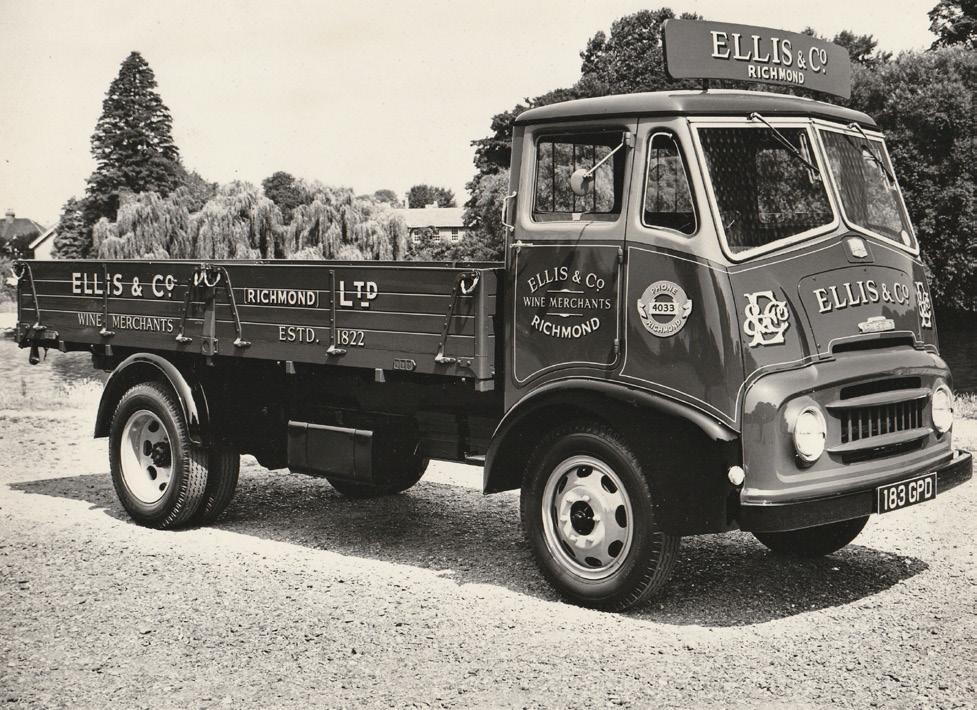

Enemy action letter to customers, 7th December 1940

Women replace men called up for service to help maintain essential work, 1940
It is not known when the first branch shop was established.
The oldest documentation in existence is from December 1886, which shows the following 4 branches:
Foxton Terrace on Richmond Hill, Teddington, Kingston upon Thames and Ealing.
By July 1901, the branches had expanded to 9:
Richmond Hill, Kingston upon Thames, St Margarets, Ealing, Teddington, Croydon, Kew Gardens, Chiswick and Barnes.
By 1911, some of the branches were publishing telephone numbers.
By 1931, the branch network had expanded to 12.
In 1938, Ellis & Co purchased 8 branch shops from Mr FB Blundell who had been trading as Theobalds, bringing the total number of branches to 21.
By the early 1950s, the branches stood at 25, mainly in Surrey, Middlesex, West London and South West London.
By the early 1960s, the branches totalled 34, with representation in Kent and Hampshire as well as North and East London.
The business continued to grow and by 1978 the firm had 72 outlets:
London – 20, Middlesex – 13, Surrey – 21, Hampshire – 4, Other counties – 14
It was in Spring 1978 that Ellis & Co (Richmond) Ltd merged with Gough Brothers Ltd to form a combined entity with over 210 outlets.
Within two years these branches would eventually become ‘Oddbins’ under the ownership of Scottish & Newcastle Brewery.
It is not clear when we started owning on trade premises but between 1918 – 1939, Ellis & Co. had the following leases or tenancies:
The Hop Poles, Hammersmith, West London
• disposed of in 1956
The Elephant & Castle, South East London
• destroyed in WWII
Criterion Hotel, Bournemouth
• taken back by Bass in 1967
Palmerston Arms, Boscombe
• included a beer bottling business, which at its height was bottling 100,000 dozen per annum
• taken back by Bass in 1974
The Queens, Southampton
• reconstructed in 1958 following its destruction in WWII
• taken back by Bass in 1967
Warrens, Southampton
• taken back by Bass in 1967
The Castle Hotel, Richmond
• surrendered the lease in 1951 following disappointing trade post war
Onslow Arms, Clandon, Surrey
• acquired 1965, disposed 1968

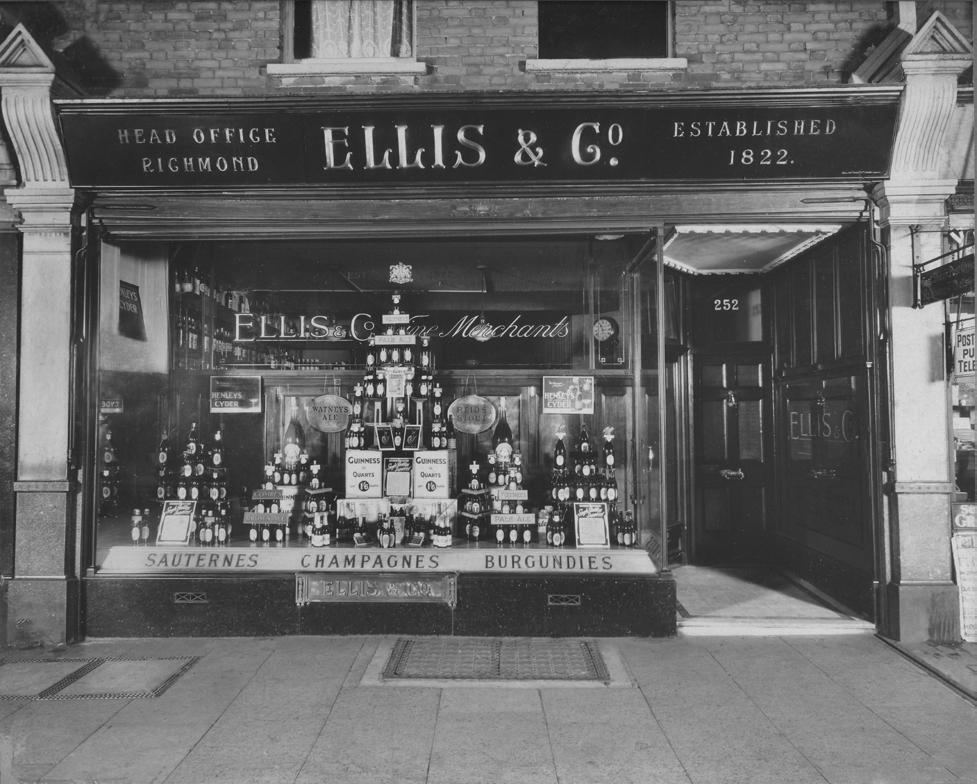







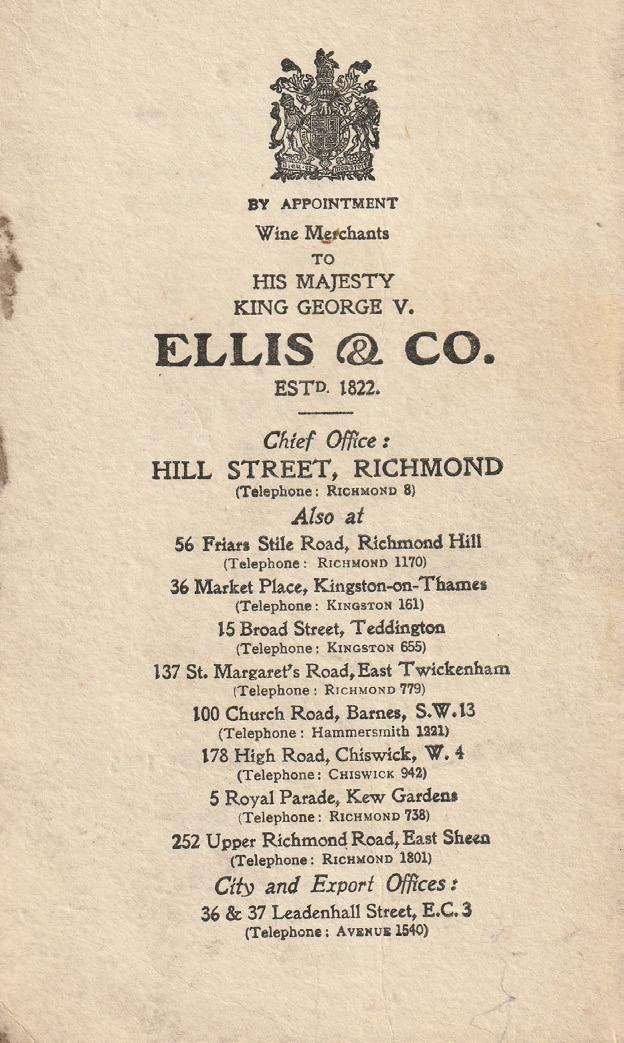






The early days saw the business being run out of the former garage of Ellis & Co. in St Margarets (see page 58), East Twickenham, then moving to Station Road, Teddington between 1986 and 2002 and now at The Links in Hanworth, north of Sunbury.
From the beginning the company focused on supplying the on trade, initially in the Home Counties but, subsequently expanding into London and the South East.
By 2000, our agency arm, Richmond Wine Agencies, had been conceived and since then the business has continued to supply a broad range of customers nationally across the hospitality sector.
The company is run by Colin Ellis’s three sons; James, Robert (both started in the early 1980s) and William (started in late 1990s), along with Martin Longley and Peter Harwood.
Martin Longley started with the business in 1969 as a shop assistant in Oxted, moving to be the company’s principal salesman in the 1980s, when he was joined by Peter Harwood in 1990.
Between them both, they helped develop the business we see today, employing over 90 staff and stocking over 1,000 wines from over 200 wineries and with a turnover of £30 million.
In June 2022, Ellis Wines hosted a portfolio tasting at the Royal Opera House, to celebrate 200 years of the business. Producers came to pour their wines for customers and a dinner was held in the evening to celebrate the occasion.
The next generation; Stefan, Holly and Angus Ellis, have already found their feet in the business, hopefully ensuring the beginning of the next 200 years.



“The relationship between Ellis and AR Lenoble is a special, unique, longstanding partnership starting nearly 40 years ago. As family-owned businesses we share the same values of commitment, courage, resilience and respect. It is business for sure, but it is even more pleasure and fun. I am glad to see the new generation joining the company to perpetuate this collaboration for another 40 years of friendship.”
Anne Malassagne, AR Lenoble
Today, we continue to work with many of our suppliers from those early days of the 1980s and early 1990s, most notably:
• Champagne AR Lenoble – we started our relationship with Anne and Antoine Malassagne’s father in 1983, supplying us with the wine for Vauban Freres.
• Domaine du Prieuré (Burgundy)
• Domaine de l’Amandine (Rhône)
• Domaine Merlin-Cherrier (Sancerre)
• Domaine Landrat-Guyollot (Pouilly)
By the late 1990s, we were also buying wines from:
• Domaine Auvigue, Domaine Alain Michelot & Domaine Jean Tardy (Burgundy)
• Domaine Herbauges & Domaine de la Bergerie (Loire Valley)
• Geoff Merrill (South Australia)
• De Wetshof Estate & Backsberg Estate (South Africa)



